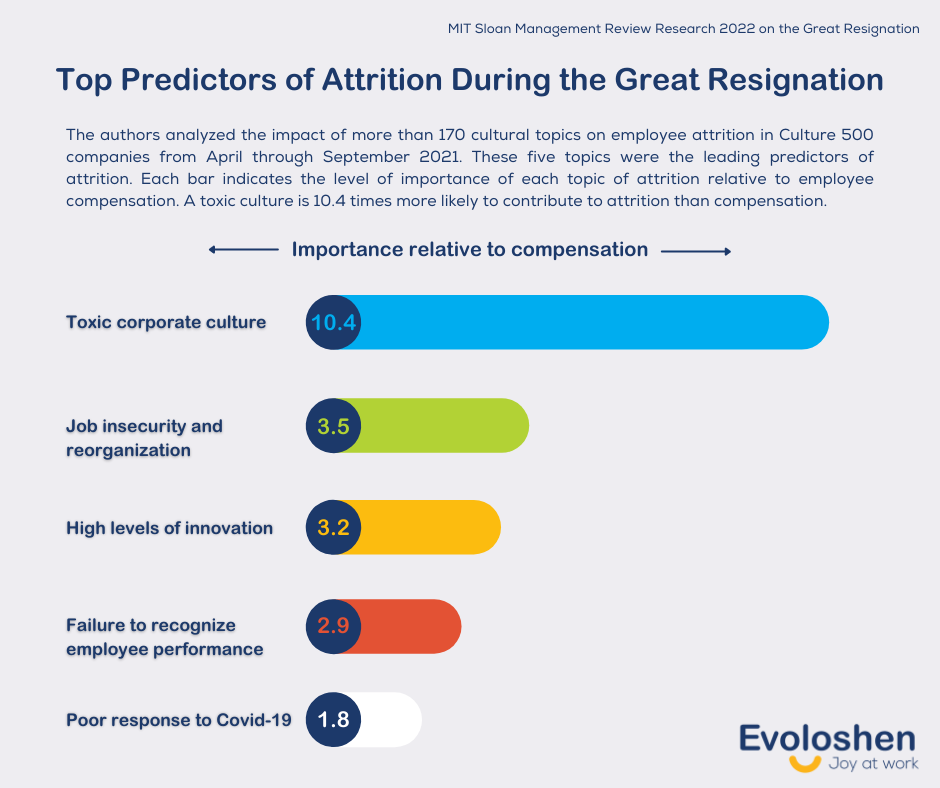
Let’s face it, toxic cultures suck. The majority of us have worked in jobs and at companies we really didn’t like and did it for the money, convenience, bidding our time until we could get the heck out of there. The global pandemic has given so many people time to reflect on their own lives, their priorities, and how they want to be spending their time each day. The level of tolerance has dropped immensely, and people are leaving certain companies in droves (more on this in a minute).
According to recent research from MIT, the biggest reason for the Great Resignation is toxicity in an organization. “A toxic culture is by far the strongest predictor of industry-adjusted attrition and is 10 times more important than compensation in predicting turnover”.[i]

The core cause of a toxic environment is most often bad managers or leaders. Gallup’s research has shown that culture attracts people to company but that they leave because of a lousy manager. Turnover is quite often a management issue! Many times, these individuals have been promoted without having the right skills for leading people, nor the levels of emotional intelligence necessary to understand how their own behavior impacts others. They can often be described as a bull in a china shop because they can cause so much damage and not even have a clue. Garry Ridge, an amazing CEO at the WD-40 Company, calls these managers “soul sucking CEOs or leaders” because they’ll suck the soul energy out of their people. And now we are reaching a point where people simply will not stay.
When we drill down even further, hiring and keeping great people becomes an issue of trust and caring. Employees will stay longer with their company when they:
- feel valued, appreciated, and recognized for their work
- have a sense psychological safety
- believe that the company and their managers truly care about them as a person
- are aligned to the values and the bigger purpose that they genuinely feel connected to on an emotional level
And here’s some good news….
Companies that are already actively working on their culture are getting overwhelmed with applicants. Their reputation spreads quickly through word of mouth and social media. It is much easier for them to both attract and retain top talent.
So, is it possible to change a toxic culture before it’s too late?
It’s important to understand the dynamics within an organization and all the teams that make up a company. There may be pockets of greatness and then some areas that are toxic. Changing a culture takes some time but if the top management commits to it and has buy in and can communicate the process well, it is absolutely possible! I’ve seen examples of this transformation in companies time and time again. The bottom line is that developing great leaders is essential.
Here are 7 Steps for Culture Change that we work with at Evoloshen:
- have all executive management take ownership of the culture—do NOT delegate solely to HR
- have a strong bigger purpose and living values
- create a high trust and caring culture
- give opportunities for development and growth to all employees
- measure culture to make it tangible through the 5 Cultural Keys of collaboration, creativity, connection, celebration & contribution
- work with creating cultural engagement systems — your cultural road map
- empower employees to focus on their own engagement and contribution to the culture
If you’d like to discuss anything about this process, please reach out. We are here to support these incredible journeys. Just know that it IS possible to create an amazing company culture!
[i] https://sloanreview.mit.edu/article/toxic-culture-is-driving-the-great-resignation/






